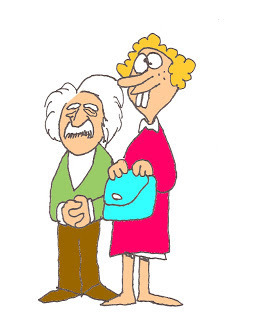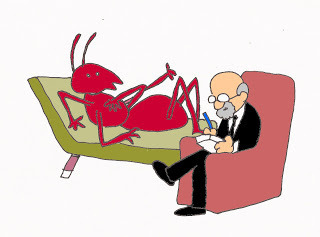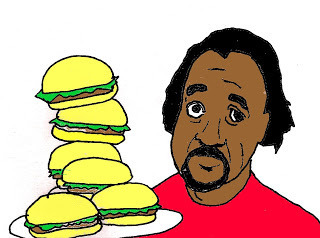Man Martin's Blog, page 161
May 31, 2013
Never Marry Anyone Dumber Than You and Other Advice
 The other night we had dinner with my cousins Don and Judy who'd come up from Florida to do some shopping and gallivant in Atlanta. Over crepes, Judy opined that she wouldn't have married Don if he weren't "just a little bit smarter" than she was, and that she saw trouble looming large and unmistakable for any couple where one partner was significantly brighter than the other.
The other night we had dinner with my cousins Don and Judy who'd come up from Florida to do some shopping and gallivant in Atlanta. Over crepes, Judy opined that she wouldn't have married Don if he weren't "just a little bit smarter" than she was, and that she saw trouble looming large and unmistakable for any couple where one partner was significantly brighter than the other.Nancy amended this to say that she and I are smarter than each other "in different ways." For example, I completely suck at navigating streets. Back in the days before GPS, Nancy took me on a shortcut, and we drove through streets to me as unfamiliar as anything on Mars, until finally we turned a corner, and I exclaimed in triumph, "I know where we are!" We'd arrived on our own street. The mysterious route she'd taken me on was through our own subdivision.
As if to compensate for this deficit, I have an inherent knack for navigating in what Nancy calls "fantasy land." Plop me down in an amusement park anywhere in the world, with its winding circuitous paths that loop and intersect without rhyme or reason, and in a few minutes I can tell you exactly what you need to do to get to the tilt-a-whirl or the food pavilion.
Nancy is good at all the day-to-day financial stuff: making sure the light bills are paid and the dog's ear drops are current. I, and this is as astonishing as anything ever written in a blog, am the one who handles our investments.
Nancy can recognize any actor and tell you after a moment's consideration every movie he or she has appeared in. I cannot do this. I believe I have a mild case of face-blindness - or, no, face-blindness is too harsh. Maybe it's just face-astigmatism, but in any case, I am incapable of identifying any celebrity whose image hasn't been pounded into my brain by constant appearance on magazine covers at the grocery checkout.
And Nancy reads a lot more than I do; she easily finishes four or five books in the time it takes me to read one. I recently finished two books by friends of mine (Where You Can Find Me by Sheri Joseph, and The Home Jar by Nancy Zafris) and I worry I might offend them by how long it took me to get around to reading them, but I can't help it. I'm just a slow reader.
But I do remember stories - it may take me forever to get through a book, and I may not be able to spot Janeane Garofalo from James Gandolfini, but I remember what the stories were about. Sometimes I recall entire passages. Decades after reading them, I can tell you about the wonderful metaphor B F Skinner used with the word "precessing" or how Frazier (in a greatly abridged version of The Golden Bough) used another metaphor employing black, red, and white threads to represent magic, religion, and science.
So back to the actual topic of this blog, which is selecting a partner based on his or her intelligence. What you really want is someone who is both stupider and smarter than you are... in very specific ways.
Published on May 31, 2013 03:25
May 30, 2013
Crazy Ants Invade Texas
 Fire Ants, long considered the biggest entomological nuisance in Texas are being displaced by Crazy Ants, highly a highly prolific species from South America. While Crazy Ants do not sting, their sheer numbers and willingness to invade homes have made residents long for the days of good old Fire Ants. - News Reports
Fire Ants, long considered the biggest entomological nuisance in Texas are being displaced by Crazy Ants, highly a highly prolific species from South America. While Crazy Ants do not sting, their sheer numbers and willingness to invade homes have made residents long for the days of good old Fire Ants. - News ReportsCathy Sturmbracher of Dallas Texas, is one person who has contended with the insect menace. "First they invaded my house," she said, "and got into my pantry. These particular Crazy Ants have OCD. Now everything inside is stacked in weird but very neat piles. And if I move anything, forget about it! The ants have a fit."
Doug Risby of Fort Worth has a similar story to tell. "When the ants around here are manic, it's bad enough. They're up all night, talking on the phone, they're filled with this weird impractical projects and wacky incoherent thoughts, but then when they're depressed, it's even worse. They stay in the bed all day and just mope. It's a real downer."
Still, Risby has it easy, according to Sally Porter of Corpus Christie. "Mine have Multiple Personality Syndrome. One day they think they're chickens, and all day long it's 'buck-buck-bacaw' in those irritating little ant voices. Then they think they're a shy little girl named Sally, and they sit in the corner all day sucking their thumb and holding a baby doll. One day they got it in their head they were elephants, and they stampeded my hydrangeas. I've just about had it."
Troubles for Texas, however, won't end any time soon, say experts. Neurotic Ants are even now swarming down from the north, along with Passive-Aggressive Ants, and Co-Dependent Ants.
Published on May 30, 2013 06:40
May 29, 2013
Nude Scenes That Didn't Make The Cut
 Star Trek into Darkness: After admitting Alice Eve's underwear scene in Star Trek was "gratuitous," director David Lindelof revealed he'd also filmed an "evil shower scene" featuring the villain played by Benedict Cumberbach, which wound up being cut before the film was released.
Star Trek into Darkness: After admitting Alice Eve's underwear scene in Star Trek was "gratuitous," director David Lindelof revealed he'd also filmed an "evil shower scene" featuring the villain played by Benedict Cumberbach, which wound up being cut before the film was released. Hitchcock: Last summer's flick about the creation of Psycho originally featured a brief clip of Hitchcock (Anthony Hopkins) concocting the infamous shower scene while he himself was in the shower. "We deleted the scene," Sacha Gervasi explains, "when we realized it was more horrific than the original."
 Lincoln:
According to the original screenplay, Thadeus Stevens (Tommy Lee Jones) was to be completely naked when getting into bed with his lover, Lydia Hamilton Smith (Epatha Merkerson). During an attempt to film the scene, Merkerson went into hysterics and had to be hospitalized several days for uncontrollable screaming and fits of vomiting.
Lincoln:
According to the original screenplay, Thadeus Stevens (Tommy Lee Jones) was to be completely naked when getting into bed with his lover, Lydia Hamilton Smith (Epatha Merkerson). During an attempt to film the scene, Merkerson went into hysterics and had to be hospitalized several days for uncontrollable screaming and fits of vomiting.Life of Pi: Director Yang Lee admits to second thoughts about artistic choices he made in the film. Richard Parker, the digitized tiger that accompanies Pi on his sea voyage is shown nude throughout the film, causing critics to bemoan the gratuitous nudity of computer-generated special effects. "First Jurasic Park," says noted film critic Barbara Bachmann, "which should have been Jurassic Stark-Naked, then that filth, Ice Age, and March of the Naked Penguins, now this! For the love of Jesus, put some clothes on those animals! Children are watching!"
Published on May 29, 2013 03:03
May 28, 2013
Packaging
 So for my birthday, Nancy and Spencer got me a fancy Garmin GPS watch that will calculate distance, speed, and tell time. I believe it will also tell me the weather in case I can't tell I'm being rained on. Evidently Spencer got tired, every time we went running together, of my asking her every fifty paces, "How far have we gone now? How far have we gone now?"
So for my birthday, Nancy and Spencer got me a fancy Garmin GPS watch that will calculate distance, speed, and tell time. I believe it will also tell me the weather in case I can't tell I'm being rained on. Evidently Spencer got tired, every time we went running together, of my asking her every fifty paces, "How far have we gone now? How far have we gone now?" Spencer has her own GPS watch, you see, one of the drawbacks to having information is that other people expect you to share it. Imagine how dreary life must have been for the first person to ever own a pocket watch, being asked every five minutes what time it was. Of course, I figure my asking Spencer twenty times a minute how far we've gone is karmic payback for all the road trips she went on as a child with her endless repetitions of, "Are we there yet? How soon will we be there?" Although, actually, as I think about it, she rarely said that, instead it was more like, "Watch where you're going! Do you want to get us killed?"
Anyway, all of the preceding was just preamble to talk about the packaging my Garmin came in, which, if you think about it, was kind of like the packaging for this blog, and is pretty meta and should make you think I'm a lot smarter than I appear and maybe treat me with respect for a change.
Garmins, and various other hi-tech devices I could name, come in devilishly complex packaging devised, I believe, by embittered unemployed NASA engineers who believe they're smarter than the rest of us, and want to make sure we believe it also. The Garmin sits invitingly behind a little plastic window, a clear plastic decal with a simulated time on its face to show you how it will appear if you ever free it from its cardboard and plastic prison. There are tabs that seem to slide from the sides of the box into the lid, but no amount of prying will get them to undo. At last, however, you cajole the box open, and emits a little avalanche of instructions, CD Roms, power cords, and adapters. Do not attempt to fit this assorted crap back in the box the way it came. It cannot be done. Stuff it in there as best you can and put it in the top of the closet where hopefully your wife won't notice it.
I should mention that when I opened the Garmin, Nancy informed me in no uncertain terms that this was a "nice" present, and I should "take care of it," not to break or misplace it. In other words, the Garmin is not so much a present as it is a test to determine my fitness to manage myself as an adult. It was like that damn hamster Mother got me as a child to teach me "responsibility." If the Garmin is a test of whether I deserve to call myself an adult, the box is a test of whether I deserve to have a Garmin, and clearly I have flunked the first test. I believe this is actually the point behind hi-tech packaging, to so demoralize the consumer that he'll be ashamed to call Customer Service when the thing breaks down. (Don't believe me? Think of the last time you called Customer Service, and try telling me all those automated instructions to "Press One for English" and "If this is correct, say yes" aren't just another technique - more packaging, if you will - to convince you that you don't belong in this century and hang up in despair.)
I compare all this to the packaging at McDonalds, a much-maligned corporation at which I myself have sometimes taken the cheap shot. The Big Mac comes in a little Styrofoam box which requires but a simple pinch of the lid to pop open like the mouth of a cooperative toad, and inside - a burger! No test here, no challenge to your wits to see if you're worthy of a Big Mac. "You're welcome," the Styrofoam Mouth seems to say. "I've been waiting for you, and you're worthy of this."
Compare that to the tangled crumpled mess that remains of my Garmin box, hidden in the top of the closet where Nancy won't see - I now perceive writing this blog may not have been the wisest course of action to maintain my secret, but no matter.
When I am cremated, I wish my remains to be scattered in a beautiful wilderness somewhere. But first I want them packaged in a Garmin box. I'll do the same for my will and all the bearer bonds and loose diamonds I currently have in my safety deposit box.
I want my heirs to dispose of me properly and I want them to enjoy the hard-won fruits of my labors. But first I want them to prove themselves worthy by the struggle to open my container.
I wonder if there's a way to install a Customer Service Line.
Published on May 28, 2013 02:59
May 27, 2013
The Home Jar by Nancy Zafris: A Review
 Never start a story with a ringing alarm clock. This is a mistake many amateur writers make, and it's a logical one; after all, if a day starts with a ringing clock, why shouldn't a story? But a ringing alarm clock is a sure sign the story will be lame. If you really want to know, here's how to start a story:
Never start a story with a ringing alarm clock. This is a mistake many amateur writers make, and it's a logical one; after all, if a day starts with a ringing clock, why shouldn't a story? But a ringing alarm clock is a sure sign the story will be lame. If you really want to know, here's how to start a story:"There came a day when I stole the llama farm from Amy Boyd."
That sentence, the opening line from Nancy Zafris' short story collection, The Home Jar, is a flat masterpiece. I could spend a week just analyzing the weight of meaning in the idiom, "there came a day." An opening sentence isn't an alarm telling you, "Wake up and start reading," it's a promise that what follows with be worth reading about. Writing a great opening sentence, making an irresistible promise is half what it takes to be a great writer. Keeping the promise is the other half. Nancy Zafris is master of both.
Obviously, "Stealing the Llama Farm" will have a strong and distinctive flavor, and if Zafris attempted to repeat the recipe over and over, the delight would soon cloy. But Zafris is far too versatile for that; Home Jar contains a panoply of voices and worlds, and as you read, it dawns on you that you are in the presence of a writer whose home is not Ohio, but the world. The thing I would love to ask her is just how the hell she so convincingly brings us such diverse experiences. The title story is about an Eritrean. Does anybody out there even know where Eritrea is? I had an Eritrean student, and I cannot convey the intense passionate pride he had in his homeland. Never have I felt the glow of real patriotism before meeting him. How did Zafris know about that? How did she know Eritrea was the perfect country of origin for a man who winds up being degraded to help the family he no longer even knows? How does Zafris know what it's like to be a Japanese stewardess? Does she wake up to the alarm clock and say, "What shall I write about today? An Eritrean? A Japanese stewardess? Maybe something with llamas?" Or does she start with the particular longing of her characters and twist and turn it in her hands until she realizes this one sorts metal and this one hunts lepers.
It really doesn't matter how she enters these worlds, but that she does it so well. And that she brings us with her.
Published on May 27, 2013 02:51
May 26, 2013
A Dog's View of Time
 We live near a trail where we walk Zoe each day, and which serves as a barometer of Zoe's advancing age. When she was young, she could walk the whole trail and still have energy left over; these days, by the time we've made a complete circuit, her tail hangs limp and she's panting. When she gets home she drinks a big bowl of water and then just wants to lie on the rug. Most days we just do half the trail, but even that is starting to tire her out. Still, it's her favorite part of the day, and she romps and wags just at the prospect of going for a walk. I wish I enjoyed anything on this earth as much as Zoe enjoys the trail.
We live near a trail where we walk Zoe each day, and which serves as a barometer of Zoe's advancing age. When she was young, she could walk the whole trail and still have energy left over; these days, by the time we've made a complete circuit, her tail hangs limp and she's panting. When she gets home she drinks a big bowl of water and then just wants to lie on the rug. Most days we just do half the trail, but even that is starting to tire her out. Still, it's her favorite part of the day, and she romps and wags just at the prospect of going for a walk. I wish I enjoyed anything on this earth as much as Zoe enjoys the trail. When we got Zoe as a puppy, I wasn't exactly young myself - forty-three or two, but in the intervening years she's gone from puppy-hood to late middle age, whereas, I've moved relatively little. (I'm fifty-four now, but I'm still about as physically capable as I was ten years ago.) It is strange, when I think about it, sharing the home with a loved one who ages so quickly, but it must be even stranger for Zoe to share a home with Nancy and me who must not seem to age at all.
When we got Zoe as a puppy, I wasn't exactly young myself - forty-three or two, but in the intervening years she's gone from puppy-hood to late middle age, whereas, I've moved relatively little. (I'm fifty-four now, but I'm still about as physically capable as I was ten years ago.) It is strange, when I think about it, sharing the home with a loved one who ages so quickly, but it must be even stranger for Zoe to share a home with Nancy and me who must not seem to age at all.Does she think we're immortal? Is she even aware how she herself has aged?
Of course, I'm not immortal, and there are trees in our own backyard, that have watched my hair - what there is of it - turn gray and spots appear on the backs of my hands. If trees could see, which I suppose they can't. Barring a storm that knocks them down, some of these same trees, scarcely changed, will observe me taken from the home a final time, and one day the post-funeral celebration of my family. They have watched others age and die on this street, and children born, grow, and move away.
 But trees are not immortal either, and if they could see the white cap of Stone Mountain in the distance, they might ponder how it has not changed their entire lifetimes, and Stone Mountain might look at the sun, and the sun, well...
But trees are not immortal either, and if they could see the white cap of Stone Mountain in the distance, they might ponder how it has not changed their entire lifetimes, and Stone Mountain might look at the sun, and the sun, well... In the river of time, we all move downstream, just some of us move more slowly than others.
Meanwhile, Zoe wants to go see the trail again.
Published on May 26, 2013 03:48
May 25, 2013
Pope Francis Drops a Bombshell
 Pope Francis rocked some religious and atheist minds when he said all who do good, including atheists, are redeemed by Christ. - Huffington Post
Pope Francis rocked some religious and atheist minds when he said all who do good, including atheists, are redeemed by Christ. - Huffington PostIn other news, Tom Cruise said people shouldn't get too hung up worrying over Body Thetans displaced by the evil Galactic Dictator Xenu. "You can still be a good person without believing in Body Thetans," Cruise said. "The Body Thetan thing is more like just a metaphor."
In a nationwide televised speech, Kim Jong Un told the people of North Korea they didn't have to do everything he said. "When I issue an order," Kim said, "I want you to think of it more as a suggestion. Like a guideline. Now if it's something important, like we're invading America or something, I'll let you know. I'll say something like 'urgent.' Otherwise, just take what comes out of my mouth with a grain of salt. I do a lot of talking and half the time I'm not even listening to myself. So everyone should just chillax."
Yusuf Qaradawi, known for You Tube harangues to "conquer America" says you don't have to be a jihadist to find seventy-two virgins waiting for you in heaven. "There's lots of ways of serving Allah," Qaradawi said, "some people do it by unprovoked acts of terror, others by bringing meals to shut-ins or just being a good listener to someone going through a bad patch. You don't have to be Muslim; Christians and Jews have virgins waiting for them, too. Basically everybody gets seventy-two virgins. Unless you're a virgin yourself. Then I don't know what happens."
According to National Park Rangers, popular beliefs about bears' defecatory habits are greatly oversimplified. "The whole thing about doing it in the woods," reads a press statement, "yes, bears sometimes go in the woods if they're desperate and don't have time to get to a toilet, but then, who doesn't? Normally bears use public restrooms, but what they really prefer is a bidet."
Published on May 25, 2013 03:10
May 24, 2013
Charles Ramsey: "I am so sick of burgers."
 "Local hero and burger enthusiast Charles Ramsey will never have to pay for a beef patty in Cleveland again, thanks to a special free burger card good at more than a dozen area restaurants. Ramsey became a national sensation this month after giving helping free Amanda Berry, Gina DeJesus and Michelle Knight earlier in May. "I heard screaming," Ramsey told reporters after the rescue on May 6. "I'm eating my McDonald's, I come outside, I see this girl going nuts trying to get out of her house. So I go on the porch and she says, ‘Help me get out, I’ve been here a long time.'" The Internet quickly latched onto Ramsey's McDonald's detail, and the fast food chain was soon swamped by people asking the company to honor the burger-loving neighbor. While he has said he would give any reward money back to the victims, restaurants in and around Cleveland have signed on to provide Ramsey with burgers whenever he wishes, according to the Cleveland Plain Dealer." - Huffington Post
"Local hero and burger enthusiast Charles Ramsey will never have to pay for a beef patty in Cleveland again, thanks to a special free burger card good at more than a dozen area restaurants. Ramsey became a national sensation this month after giving helping free Amanda Berry, Gina DeJesus and Michelle Knight earlier in May. "I heard screaming," Ramsey told reporters after the rescue on May 6. "I'm eating my McDonald's, I come outside, I see this girl going nuts trying to get out of her house. So I go on the porch and she says, ‘Help me get out, I’ve been here a long time.'" The Internet quickly latched onto Ramsey's McDonald's detail, and the fast food chain was soon swamped by people asking the company to honor the burger-loving neighbor. While he has said he would give any reward money back to the victims, restaurants in and around Cleveland have signed on to provide Ramsey with burgers whenever he wishes, according to the Cleveland Plain Dealer." - Huffington PostYou ever think to yourself, "Man, if I could eat just one food for the rest of my life, this would be it"?
Well, be careful what you wish for.
So after I saved those women - it was no big deal, really, I was just doing what anybody would've done - someone got on the Internet and said, "Hey, why don't we see to it Ramsey never has to buy another burger again?" When they asked me if I wanted any reward money, I just said give it to the victims, which I guess is why people went with the burger thing. Now I'm starting to rethink my answer. Not that I expect any money for just doing what any decent person would do, but for the love of God.
I am so sick of hamburgers.
Now you might say, "Well, Charles, if you don't like burgers so much, take a break from them. Eat something else for a change."
I wish it was that easy.
Everybody knows me now, and they know about the burger deal, so they're constantly after me, "Hey, Chuck, why don't you go get a free hamburger, you deserve it!" "Go get a burger, Chuck!" "Burger, burger, burger! Eat a burger!"
If I go in a restaurant, they bring me a burger before I can even look at the menu. God, what I'd give for a nice salad. The other day I tried to outsmart them. I asked for the cordon bleu burger, but without the bun, pickle, tomato, ketchup, or mustard. Hold the fries. But the waiter said, "But without that, it's just plain cordon bleu." So he brought me a burger. I went to Chic-Fil-A, and the manager said, "What are you doing here, Chuck! Go get yourself a burger!" He was nice as he could be, but he wouldn't serve me. He said he didn't want a hero like me to get taken advantage of.
I wish this whole thing would die down. I mean, the attention was nice and all, and I'm grateful to everyone, but I just wish my life could get back to normal.
I am so sick of burgers.
Published on May 24, 2013 03:33
May 23, 2013
Weeds
 I went out in the garden the other day and had a cow.
I went out in the garden the other day and had a cow.(The cow is not an actual cow, nor is it really a metaphorical cow. It is, I believe, a metonymic cow.)
The reason for my emotion - an emotion so strong I had to resort to bovine figures of speech to describe it, is weeds. The garden is rank with weeds.
This happens every year. The end of the semester, when I'm too busy to spend much time outside, coincides with prime weed-growing season. By the time I get around to checking on things - metonymic cows are had.
I have considered the matter carefully, and I believe the problem may lie in our whole Western approach to agriculture. Why do we privilege some plants as desirable - tomatoes, cucumbers, okra - and treat other plants - dandelions, chokeweed, crabgrass - as, well, weeds? Admittedly, chokeweed is going to have a hard time winning any popularity contests on the basis of its name. It's like when Mr. and Mrs. Unit named their little boy, G. They should have known anyone with a name like that would amount to no good.
But imagine how much simpler life would be if instead of fighting weeds, we cultivated them. Dandelions, for example, create quite pretty yellow flowers, and the little cotton balls they make are a delight to any child who's ever blown them and launched a thousand airborne seedlings. Poison ivy, that much maligned plant, is green all year long and makes an ideal covering for a privacy fence. Chickweed, I'm told, is quite tasty if used as a salad green, and bindweed, well, I don't know anything good about bindweed, except it's sometimes called a zombie plant because it's so hard to kill. Even that must be an opportunity; imagine if we could use zombies for good instead of evil.
The main point is I believe by realigning our horticultural priorities, we could make gardening simpler and more productive, a boon to mankind.
Now if we could just find a constructive purpose for fire ants.
Published on May 23, 2013 02:50
May 22, 2013
Symbols for Everyday Use
The history of mathematics is stuffed to the rafters with people who won fame primarily by inventing or popularizing some symbol. Euler, for example, popularized the use of π. He didn't discover pi, he wasn't even the first person to use the Greek letter π to represent the number. He was just the person who made it fashionable to do so, and for that he won everlasting glory. I don't know what sort of royalties he got on that, but let's suppose it was as little as one tenth of one percent of a penny every time someone wrote π. Why, I've used it three times so far just in this blog!
Ka-ching!
In the interests, therefore, of furthering the march of civilization, I propose the following innovations in symbology that we could use to express difficult mathematical concepts in our everyday life.

Moneygon: The difference between how much you think something should cost and how much it actually does.
 Timesuk: Similar to the Moneygon, this represents the difference between the time you anticipated for a project, and the actual time required.
Timesuk: Similar to the Moneygon, this represents the difference between the time you anticipated for a project, and the actual time required.
 Bytestop: The number of times you can chew your food at dinner before a telemarketer calls.
Bytestop: The number of times you can chew your food at dinner before a telemarketer calls.
 Infinitube: The function of infinitely reducible quantity of dentifrice. That is, no matter how much toothpaste you get out of the tube, there's still enough left to brush your teeth one more time.
Infinitube: The function of infinitely reducible quantity of dentifrice. That is, no matter how much toothpaste you get out of the tube, there's still enough left to brush your teeth one more time.
 Fumego: How many additional miles you can go after your fuel light comes on.
Fumego: How many additional miles you can go after your fuel light comes on.
Ka-ching!
In the interests, therefore, of furthering the march of civilization, I propose the following innovations in symbology that we could use to express difficult mathematical concepts in our everyday life.

Moneygon: The difference between how much you think something should cost and how much it actually does.
 Timesuk: Similar to the Moneygon, this represents the difference between the time you anticipated for a project, and the actual time required.
Timesuk: Similar to the Moneygon, this represents the difference between the time you anticipated for a project, and the actual time required.
 Bytestop: The number of times you can chew your food at dinner before a telemarketer calls.
Bytestop: The number of times you can chew your food at dinner before a telemarketer calls.
 Infinitube: The function of infinitely reducible quantity of dentifrice. That is, no matter how much toothpaste you get out of the tube, there's still enough left to brush your teeth one more time.
Infinitube: The function of infinitely reducible quantity of dentifrice. That is, no matter how much toothpaste you get out of the tube, there's still enough left to brush your teeth one more time.
 Fumego: How many additional miles you can go after your fuel light comes on.
Fumego: How many additional miles you can go after your fuel light comes on.
Published on May 22, 2013 03:09



